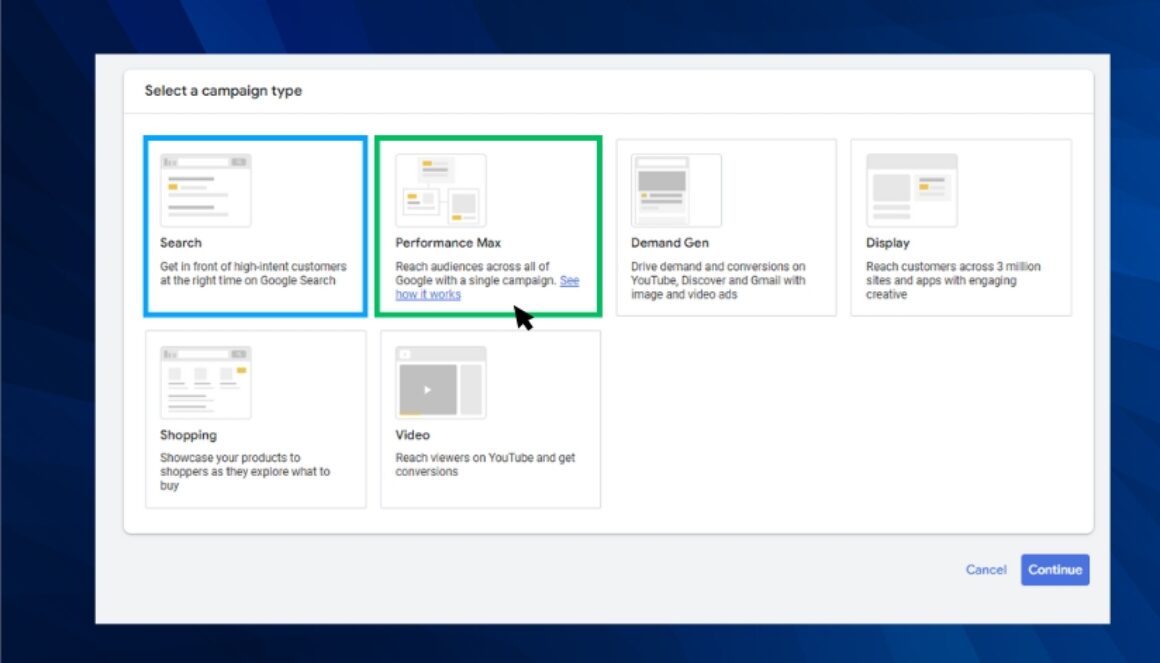Performance Max vs. Search Campaigns: Which Should You Be Using?
In the ever-evolving world of Google Ads, marketers are constantly evaluating which campaign types deliver the best results for their goals. One of the most common questions we hear today is: “Should I be running a Performance Max campaign or a standard Search campaign?”
The answer depends on your business goals, how much control you want over targeting and creative, and how much data you have to work with. Both campaign types have unique strengths—and in many cases, the most effective PPC strategies combine both.
This post breaks down the key differences between Performance Max vs. Search campaigns to help you understand when and why you should use each.
What Is A Search Campaign?
Standard Search campaigns are the traditional foundation of Google Ads. They allow you to show text-based ads to users who are actively searching for keywords you specify.
Key features of Search campaigns:
- You choose specific keywords to bid on
- You write the ad copy manually
- You control match types, negative keywords, and bid adjustments
- Ads appear only in Google search results (not across YouTube, Gmail, or Display)
This level of control makes Search campaigns ideal for businesses that know exactly what their audience is searching for and want to target those queries with precision.
What Is A Performance Max Campaign?
Performance Max (PMax) is a relatively new campaign type that uses Google’s automation to serve ads across all Google properties—including Search, YouTube, Display, Gmail, Maps, and Discover.
Instead of bidding on keywords, you provide Google with creative assets (like images, headlines, videos, and descriptions), and Google’s AI decides:
- Where your ads show
- Which audiences see them
- What combinations of creative perform best
In short, Performance Max is a goal-based campaign that prioritizes automation, broad reach, and machine learning.
Performance Max vs. Search Campaigns: Core Differences
The biggest difference between Performance Max and Search campaigns lies in control. Search campaigns offer a high level of transparency and customization, allowing advertisers to see which keywords are performing and make manual adjustments as needed. You know exactly who you’re targeting and why.
Performance Max, on the other hand, relies heavily on automation and provides limited visibility into which channels and placements are driving conversions. You give up some control in exchange for broader reach and potentially faster optimization.
Additionally, while Search campaigns only appear in search results, Performance Max campaigns run across multiple platforms, making them ideal for brand awareness, remarketing, and full-funnel strategies.
When To Use Search Campaigns
Search campaigns are still the go-to choice when:
- You want precise keyword control
- You rely on branded search terms
- Your offering solves a clear, immediate need
- You have solid historical data and know what converts
- You want full transparency over performance
Search is especially effective for lead generation, service-based businesses, and B2B campaigns where search intent is high.
When To Use Performance Max Campaigns
Performance Max works well when:
- You want broad reach across all Google networks
- You have strong creative assets (images, video, headlines)
- Your business has an e-commerce focus or a wide customer base
- You’re launching a new product or service with less search volume
- You want to scale quickly and let automation optimize in real-time
Because it uses audience signals and behavioral data, Performance Max is also helpful for discovery-based buying—when your customers may not be actively searching yet but are still a good fit.
Should You Use Both?
In many cases, yes.
Search campaigns help you reach users with clear intent—those actively looking for your product or service. Performance Max fills in the gaps by targeting users across Google’s broader network, even before they begin searching.
That said, it’s often beneficial to start with a well-established Search campaign first. When your Search campaign has a history of strong performance, it gives Google’s algorithms a clearer understanding of which keywords, audiences, and messaging resonate with your target market. This data can help guide your Performance Max campaign, enabling it to optimize more effectively from the start.
Final Thoughts
Choosing between Performance Max vs. Search campaigns doesn’t have to be a one-or-the-other decision. It’s about aligning each campaign type with your goals, your budget, and your available assets.
Search gives you precision. Performance Max gives you scale. Used strategically, they can work in tandem to grow your visibility, conversions, and ROI.
At The BLU Group, we build and manage custom PPC strategies that blend automation with oversight—so every dollar you spend works harder. Visit https://theblugroup.com/contact/ to get started today.





